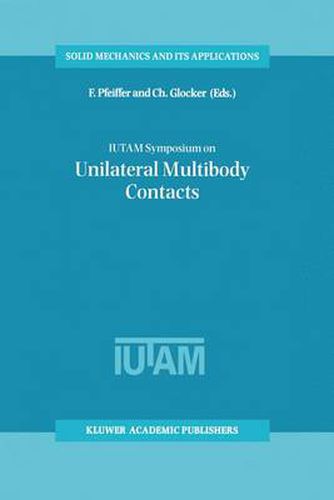Readings Newsletter
Become a Readings Member to make your shopping experience even easier.
Sign in or sign up for free!
You’re not far away from qualifying for FREE standard shipping within Australia
You’ve qualified for FREE standard shipping within Australia
The cart is loading…






This title is printed to order. This book may have been self-published. If so, we cannot guarantee the quality of the content. In the main most books will have gone through the editing process however some may not. We therefore suggest that you be aware of this before ordering this book. If in doubt check either the author or publisher’s details as we are unable to accept any returns unless they are faulty. Please contact us if you have any questions.
This volume contains papers presented at the IUTAM Symposium on unilateral multibody contacts. Multibody systems very often include phenomena like impacts, stick-slip or time-variant kinematical loops which generate an unsteady behaviour of motion. Each of these unilateral phenomena alone leads to more complexity in analyzing the motion, and the situation becomes worse if such processes take place in multiple contacts of a multibody configuration, especially if these contacts are not decoupled by some force laws, for example. For these cases, the complementary properties of contact dynamics and as a consequence the application of complementary algorithms, allows the correct and consistent evaluation of the new constraint situation after each new contact event and avoids extensive combinational searches. The time-variant structure of such mechanical systems and thus the state-dependent change of the constraint combinations and the equations of motion afford special analytical and numerical treatment. Mathematical aspects can be characterized by linear complementarity problems (LCP) for plane contacts and by nonlinear complementarity problems (NLCP), homotopy or projection methods for spatial contacts. Worldwide, there exists an increasing scientific community dealing with these problems where, especially in Europe, the efforts are concentrated on the mathematical foundation, on applications for multibody dynamics and for FE-problems. This volume will be of interest to researchers and engineers in the field of applied mathematics, physical and mechanical sciences, and engineering.
$9.00 standard shipping within Australia
FREE standard shipping within Australia for orders over $100.00
Express & International shipping calculated at checkout
Stock availability can be subject to change without notice. We recommend calling the shop or contacting our online team to check availability of low stock items. Please see our Shopping Online page for more details.
This title is printed to order. This book may have been self-published. If so, we cannot guarantee the quality of the content. In the main most books will have gone through the editing process however some may not. We therefore suggest that you be aware of this before ordering this book. If in doubt check either the author or publisher’s details as we are unable to accept any returns unless they are faulty. Please contact us if you have any questions.
This volume contains papers presented at the IUTAM Symposium on unilateral multibody contacts. Multibody systems very often include phenomena like impacts, stick-slip or time-variant kinematical loops which generate an unsteady behaviour of motion. Each of these unilateral phenomena alone leads to more complexity in analyzing the motion, and the situation becomes worse if such processes take place in multiple contacts of a multibody configuration, especially if these contacts are not decoupled by some force laws, for example. For these cases, the complementary properties of contact dynamics and as a consequence the application of complementary algorithms, allows the correct and consistent evaluation of the new constraint situation after each new contact event and avoids extensive combinational searches. The time-variant structure of such mechanical systems and thus the state-dependent change of the constraint combinations and the equations of motion afford special analytical and numerical treatment. Mathematical aspects can be characterized by linear complementarity problems (LCP) for plane contacts and by nonlinear complementarity problems (NLCP), homotopy or projection methods for spatial contacts. Worldwide, there exists an increasing scientific community dealing with these problems where, especially in Europe, the efforts are concentrated on the mathematical foundation, on applications for multibody dynamics and for FE-problems. This volume will be of interest to researchers and engineers in the field of applied mathematics, physical and mechanical sciences, and engineering.